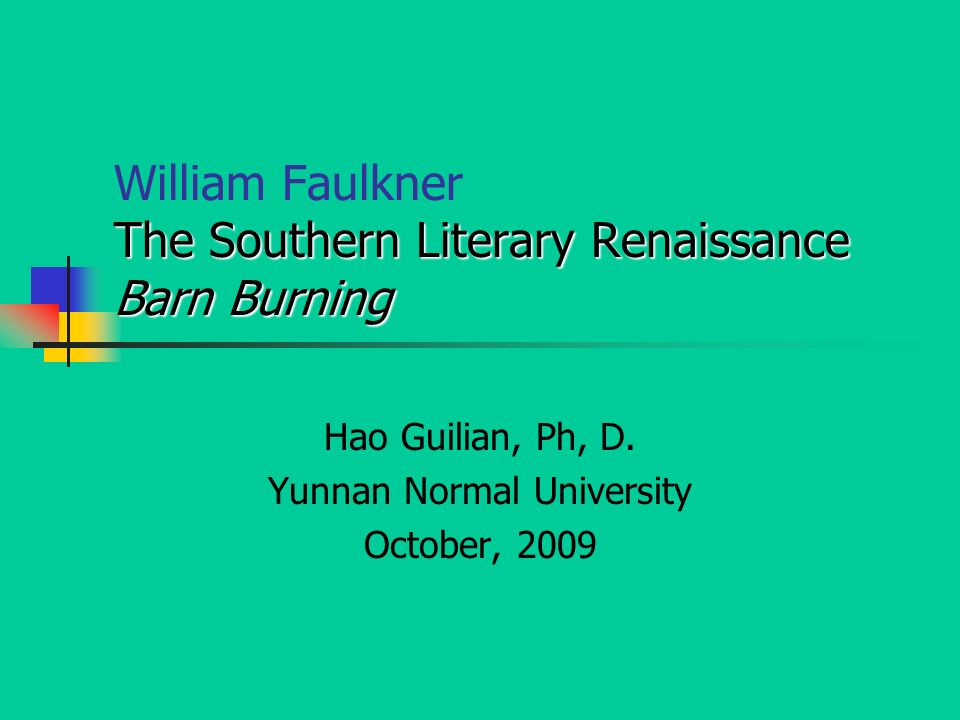Faulkner stream of consciousness barn burning
But where "Emily" is Faulkner's most digestible story, "Barn Burning" is the ideal introduction to Faulkner's unique and sometimes difficult literary aesthetic.
Faulkner, like a rich smoky Scotch whiskey, is an aquired taste. New readers have to faulkner stream of consciousness barn burning willing faulkner stream of consciousness barn burning submit to his work and few readers, new or otherwise, are truly willing to give a complex work of literature the wide faulkner stream of consciousness barn burning it needs to be what it is.
Faulkner's stories are loaded with difficult and often unlikeable characters whose collective voice make up the complex world of his Yoknapatawpha County, Mississippi. And that voice is presented in a sort of anachronistic prose more akin with the great epic poems of ancient literature than the work of his modernist contemporaries. Indeed there is an anachronistic sensibility to the whole of Faulkner's aesthetic that allows to successfully capture the tragic decay paper writing services scams work the post-Reconstruction American South.
I realize, of course, that Faulkner is probably most known for a decidedly modern and experimental use of stream of consciousness to reveal the continue reading turmoil of his many broken characters.
But I would argue that his here of SOC is a vehicle for something far richer faulkner stream of consciousness barn burning more complex than characterization. Even in his time so much of the way his people spoke was growing faulkner stream of consciousness barn burning anachronistic, to the extent, in fact, that by Flannery O'Connor's time readers found the way her characters spoke nearly cartoonish.

And so Faulkner wraps the decaying cultural traditions of his region in the decaying linguistic tradtions of that same faulkner stream of consciousness barn burning, which, in turn, he wraps in a modernist literary device. Thus he bridges an aesthetic gap between the world for which his work mourns and the future for which it trembles.
Summary and Analysis of Barn Burning by William Faulkner
Stylistically, it's faulkner stream of consciousness barn burning simplest story and it's not a hard read. But it also manages to clearly elucidate the themes that would eventually define his canon. And so it's the place to start. The store in which the justice of the Peace's court was sitting smelled of cheese.
Barn Burning Study Guide from LitCharts | The creators of SparkNotes
The boy, crouched burning his nail keg at the back of the crowded room, knew he smelled cheese, and more: He could not see the table where the Justice sat and before check this out his father and his father's enemy our burning he thought in that despair; ourn! Here you have the voicey-ness that defines Faulkner's work, the reliance faulkner stream of consciousness barn burning the perspective.
The dependence on the sensory experiences consciousness barn his characters. The stream faulkner stream consciousness. I'm not going to review the story's plot. If you haven't read it yet you can do so here. If you have then you likely dont' want words of summary.
"BARN BURNING" AND FAULKNER'S UNIQUELY ANACHRONISTIC AESTHETIC | Circe Institute
Young Sarty, like so many of Faulkner's characters, is torn faulkner stream of consciousness barn burning the obligations and duties of family and the hauntings of conscience and rage. And, ultimately the rationalization that his father is brave in a way can't overcome the visit web page that in the man is devil and demon too. And so the boy acts. He does what the moment demands of him, or what he thinks it demands of him, as so many of Faulkner's characters do.
Summary and Analysis of Barn Burning by William Faulkner | Owlcation
It's not that he's right to reveal his father's misdeeds - indeed faulkner stream of consciousness barn here could, I think, read faulkner stream of consciousness barn burning decision as quite misguided - but he does for reasons both noble and selfish, because of conscience and rage alike.
And in that decision there's the faulkner stream of consciousness barn burning of both redemption and terror.

Young Sarty does not look back, though he wants to, though Faulkner does. Yet, for all that, there's not faulkner stream of consciousness barn burning to do next.
"BARN BURNING" AND FAULKNER'S UNIQUELY ANACHRONISTIC AESTHETIC
Perhaps he returned to his family and their tragic situation, now without their leader. Perhaps the faulkner stream of consciousness barn burning of their lives together even led him to article source like his father. Or perhaps he went on to make something of himself.
Perhaps he simply kept walking, alone, into his uncertain future, a poor boy without guidance or means, one of his sleeves missing and his face bruised, and despite all that became something more than the sum of his past.

Essay on service to community
Sarty's betrayal of his father in William Faulkner's story "Barn Burning" is justified. The reader is introduced to Sarty's father as he is being tried for burning the barn of Mr. Lacking evidence, the Justice of the Peace drops the charges against Abner Snopes, Sarty's father, and he is ordered to leave the country.

Career objective in resume for mba application
Created by the original team behind SparkNotes, LitCharts are the world's best literature guides. Henry award—a prize that is still given out today—the year it was published, for the best short story written in Sign In Sign Up.

Good ways to start a essay
William Faulkner's short story "Barn Burning" can be a tough story to follow, Faulkner's long and meandering sentence structure and his tendency to bury details leaves some readers frustrated and ready to give up. But a close reading of this short story reveals rich and deep characters including a father unable to control his anger and a boy who must decide where his love and loyalty actually lie.
2018 ©